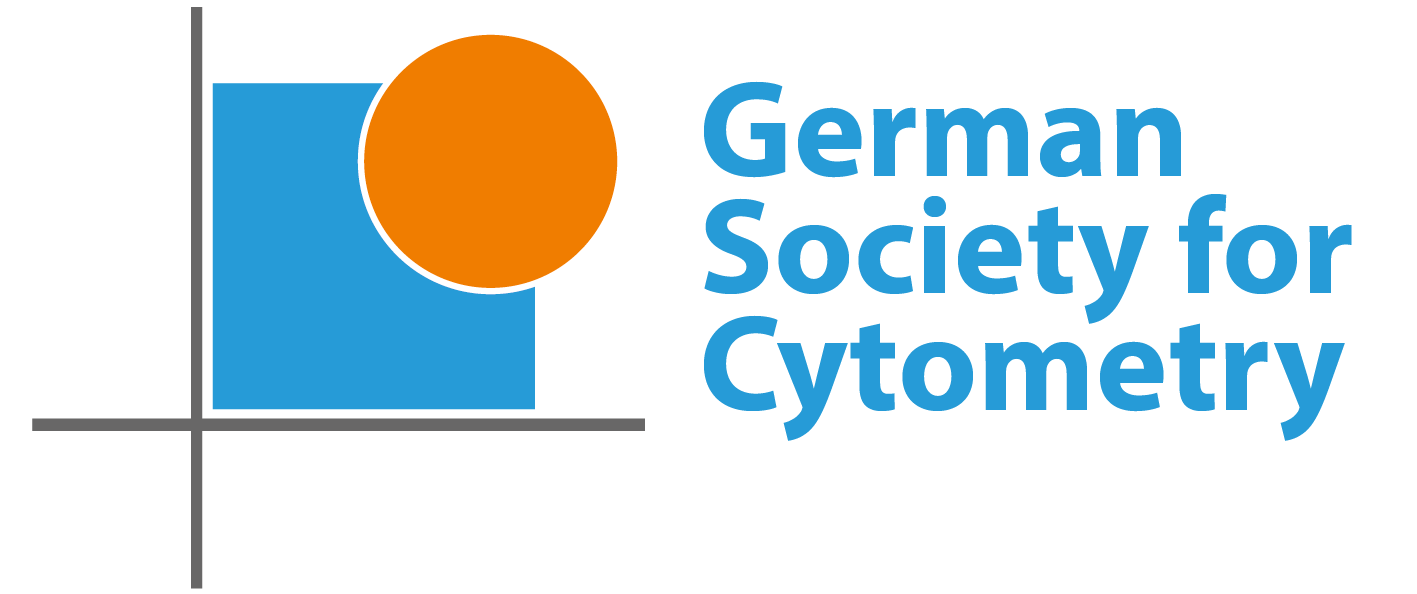Tutorials parallel
Tutorials parallel
Monday, September 18th, 2023, at 3:00 pm and Tuesday, September 19th, at 9.00 am
This year we have 4 tutorials:
- 1) Flow Cytometry, Monday, 3:00 pm: at DRFZ in seminar room 1+2
- 3) Mass Cytometry, Monday, 3:00 pm: at DRFZ in seminar room 3
- 4) Mechanocytometry for label-free cell sorting, Tuesday, 9:00 am: at DRFZ in seminar room 3
- 5) Data annotation, quality and sharing under FAIR principles, Tuesday, 9:00 am: Paul Ehrlich Hörsaal, Virchoweg 4
In case you are missing the tutorial Image Analysis: It will not take place this year.
1) Cycle Analysis by Flow Cytometry:
Monday, September 18th at 3:00 pm
Chairs: Claudia Giesecke-Thiel & Toralf Kaiser
We will briefly cover some basics of flow cytometry and then move directly to the details of cell cycle analysis using flow cytometry. We review the fundamentals in this field so that you are well prepared to conduct your own experiments. In this context, we will also introduce new technologies, in particular MAPS-FC (multi-angle pulse shape flow cytometry), an approach that measures angle- and time-resolved scattered light for high-throughput cell characterization to circumvent the constraints of conventional flow cytometry, developed at the DRFZ (Kage et al. 2021) and pulse shape-activated cell sorting (PACS), with a focus on cell cycle analysis without the need for fluorescent labeling.
3) Mass Cytometry Getting Started:
Monday, September 18th at 3:00 pm
Chair/Moderator: Sarah Warth
Speakers: Axel Schulz, Anika Rettig, Desiree Kunkel
In this tutorial experts from the field will provide an introduction to mass cytometry for a basic understanding of the technology and available tools for data analysis.
You will learn how Cytometry by Time-of-Flight (CyTOF) works and how it can be used to examine cell suspensions (CyTOF/Helios) and tissue sections (IMC/Hyperion). We will guide you through typical experimental workflows and share our experience with important aspects in the application of mass cytometry, such as sample preparation, sample barcoding, spillover compensation and batch normalization.
This is complemented by an introduction to current concepts of data analysis, both for imaging and suspension mass cytometry.
Following the introductory talks there will be time for discussion and exchange of ideas.
4) Mechanocytometry for label-free sorting:
Tuesday, September 19th at 9:00 am
Chair: Oliver Otto
Assume you are interested in the identification and classification of cells but you lack appropriate fluorescence markers or their application is inhibited in translational research. How can you then classify and characterize your cells?
Mechanocytometry can be a solution. It works like this: you excert forces on a cell and observe its deformation. What you uncover are mechanical features of cells, which establish a label-free biomarker on the cellular level instead of the molecular level. Why is this an interesting scientific target? Because the response of a cell under physiological and pathological condition depends on the cytoskeleton, the nucleus, the membrane and also sub-cellular structures. Did you know that neutrophils change their stiffness when being activated, that red blood cells get stiffer when infected with malaria or that human stem cells derived from bone marrow are softer than the ones from peripheral blood?
Real-time deformability cytometry (RT-DC) is the fastest way to do mechanocytometry. RT-DC is a combination of force application for single cells and fast imaging complemented with the capabilities of fluorescence-based flow cytometry. Besides biophysical information (stiffness, shape, morphology…) RT-DC also provides you with a brightfield image of every cell. What you see is what you get! You can easily identify debris or explore outliers. Importantly, mechanocytometry can also be combined with cell isolation, i.e., you can sort cells label-free based on biophysical parameters.
If you are interested in having a different perspective at your samples, register for the tutorial: Mechanocytometry for label-free cell sorting. We will show you live measurements and sorting using the AcCellerator from Zellmechanik Dresden equipped with a SortingModule.
5) Data annotation, quality and sharing under FAIR principles
Tuesday, September 19th at 9:00 am
Chairs: Christian Busse, Sebastian Ferrara & Amro Abbas
Data sharing and the reuse of publicly available datasets are becoming increasingly important in immunological research. In this tutorial, we will introduce the National Research Data Infrastructure for Immunology (NFDI4Immuno) project, its goals, and its potential impact on data sharing, collaboration, and progress in immunological research, especially considering FAIR principles. Additionally, we will illustrate how to generate high-quality datasets and demonstrate the dos and don’ts of metadata annotation of cytometry datasets with a hands-on approach.
